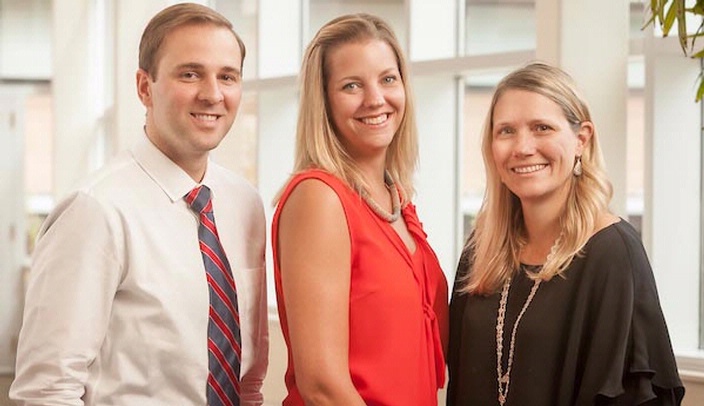For a decade, Jill Poole, M.D., was the only faculty member as an asthma, allergy and immunology specialist in the UNMC Department of Internal Medicine. She and physician assistants struggled to keep up with patient demand in the clinic.
But that’s changed recently and just in time. There’s a burgeoning increase of patients needing help.
Dr. Poole recruited three more physicians — physicians she mentored as students and/or residents — Sara May, M.D., Andrew Rorie, M.D., and Joel Van De Graff, M.D. Dr. Van De Graff is scheduled to arrive in August. Their services have expanded to Village Pointe and Bellevue Medical Center and later this year to Children’s Hospital & Medical Center. In addition, two nurses on staff specialize in allergy and immunology.
“It’s been fun because we’ve been getting out into the community to open allergy practices plus we all have clinics on the main campus,” Dr. Poole said. “It was a ripe opportunity for me 12 years ago to come here and start the practice. Now, it is wonderful to have such amazing partners and watch them grow the practice.”
Examples of the new growth include testing for penicillin and cephalosporin drug allergies as well as expansion of skin disease allergy testing.
Clinicians have seen an increase in allergies since the 1990s.
“In the 1970s, the need was minimal with 10 to 15 percent of the population with allergic disorders. Now, half of the population has some type of allergic disease,” Dr. Poole said. “In children and adults there’s just so much allergic disease, immune problems, drug and food allergy, asthma, and skin disorders.”
The reasons for this increase, she said, are probably a lecture itself.
“In addition to hay fever, we’ve seen a spike in the last 20 years of food allergies in both kids and adults, and we don’t know all the answers though it’s being researched. A new allergic disease that was essentially unheard until the late 1990s is allergic inflammation of the esophagus that causes problems swallowing food. We are now seeing a lot of it,” she said.
Along with the demand have come new and better drugs for allergy and asthma.
In this upcoming year, they will open up month-long allergy and immunology rotations for medical students and residents – something she said now is intermittent.
Another five-year goal is to have a two-year fellowship program that trains internal medicine and/or pediatric physicians to specialize in allergy and immunology after residency training.
